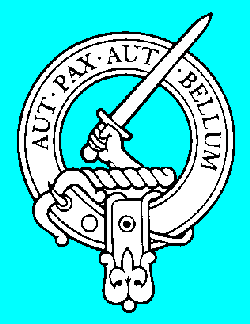

The clan's founder was a Norse pirate, Gunni, son of Olaf the Black who ruled Orkney and the Isles in the 13th century. The clan was based in Ulbster, Caithness, a few miles south of modern-day Wick. In the 15th century Gunni's descendants and the clan Keith were continually at war. The daughter of Lachlan Gunn was carried-off by a Keith to Ackergill where, rather than face dishonour, she threw herself from the top of a high tower. In 1426 the two clans fought a desperate but indecisive battle near Thurso. A similar engagement occurred in 1438 on the Muir of Tannach where the Gunns were defeated. Some twenty years later, in 1464, The two clans agreed a friendly settlement but the treacherous Keiths attacked the erstwhile friendly clan without warning and the Gunns were cut to pieces.
One story has it that to settle the feud once and for all a meeting was arranged in the chapel of St Tayr in Caithness. Each clan was allowed 12 horsemen. The dozen Gunns included the chief of the clan and several of his sons. At the appointed hour the Gunns entered the chapel and immediately started to pray in front of the alter. While the Gunns were at their devotions the Keiths arrived, led by the laird of Inverugie and Aikregell. The Keiths also had their one dozen horses as agreed, but instead of one rider to each animal every horse carried two men. The Keiths stormed the chapel catching the praying Gunns unawares.
The Gunns, outnumbered two to one, were slain to a man. The Gunns fought long and hard but many of the Keiths were also slain in the vicious fighting. There was one survivor, James Gunn, a son of the clan chief, but only because he'd been unable to be at his father's side in the chapel. After the slaughter, James settled in Sutherland for safety. There he married and had a son.
It is from Henry Gunn that the Henderson clan of Caithness are descended. Sir William Gunn fought valiantly under Gustavus Adolphus King of Sweden (1611-1632). In 1636 on the Plains of Westlock, Charles I knighted William for his bravery when he was instrumental in defeating the Austrians.
In heraldic terms the Gunn crest is:
'A Right Forearm Holding a Sword in Bend all Proper'.
The Gunn plant-badge, is either juniper or a rose root.
The scattering of the clans, due in part to the Disarming Act and also due to the altered economic conditions of the time, was fostered by the Hanoverian government to put pressure on the clan chiefs already crushed by their devotion to the Stewart kings and their support for the Jacobite Rebellion. After 1745 large sections of land and estates were confiscated. Between 1763 and 1775 no fewer than 20,000 Highlanders, including the Gunns and Wilsons, found refuge in Ulster, England and America. Lured south across the border into England, many crofters were forced to sell their homelands to English sheep-farming speculators who, with the connivance of emigration agents, made vast fortunes depopulating the Highlands. It is likely that these lowland Wilsons ventured south over the Border taking their wool-weaving skills with them into Yorkshire where a lucrative weaving industry flourished in The Dales.
Jack Wilson, my great-great-grandfather, Harry Wilson, my great-grandfather, and John Walter Wilson my grand father were all born in Sheffield, Yorkshire. All three were "little mesters" or spring-knife cutlers. I do not know whether these Yorkshire Wilsons are descendants of the English Wilsons or belong to one of the many septs of clan Gunn. But I'd like to believe so!
Famous Wilsons:
a. Wilson, Alexander, ( -1813) US ornithologist who named Wilson's Petrel Oceanites oceanicus a small petrel which breeds in Antarctic waters and visits the southern Atlantic in summer. (Also the name of my yacht 1968)
b. Wilson, Andrew (1780-1848) Watercolour artist.
c. Wilson, Angus (1913-1991) Author.
d. Wilson, Colin (1931- ) Author.
e. Wilson, Charles T. R. (1869-1959) Nuclear physicist. Photographs of 'cloud chamber' in 1912 later used in detection of protons and electrons.
f. Wilson, Edmund (1895-1972) Author.
g. Wilson, Harold, Baron Wilson of Rievaulx (1916-1995) UK Labour Prime-minister 1963. Famous words; "This (re-valuation of Sterling) will not affect the pound in your pocket"
h. Wilson, Harriet (1789-1846) UK Writer.
i. Wilson, John (c1627-96) Minor UK Restoration Playright.
j. Wilson, John H (1774-1855) Watercolour artist.
k. Wilson, John (1785-1854) Writer alias Christopher North, Noctes Ambrosianae l. Wilson, John (?-1889) UK Poet.
m. Wilson, Marie, Hollywood film actress Babes in Toyland, Broadway Musketeers
n. Wilson, Richard RA (1714-1782) Landscape artist and draftsman.
o. Wilson, Richard, Film director Al Capone, Raw Wind in Eden
p. Wilson, Richard, Film and Television actor One Foot in the Grave (TV Series).
q. Wilson, Samuel, (-1937) Neurologist and discoverer of Wilson's Disease an inherited disease caused by an inability of the body to deal with copper in the diet.
r. Wilson, Scott, Film actor The Great Gatsby
s. Wilson, Teddy (Theodore) (1912-1986) US bandleader and jazz pianist.
t. Wilson, Thomas (1525-1581) Elizabethan politian, Writer.
u. Wilson, Thomas (1663-1755) UK Clergyman, Writer.
v. Wilson, L. Hugh. Architect, Cumbernauld New Town, nr Glasgow in 1958
w. Wilson, Sandy (1924-?) Playright, The Boy Friend.
x. Wilson, Dr. William (Bill) (?-1912) Died with Robert F Scott on expedition to the Antarctic.
y. Woodrow-Wilson, Thomas. Democratic President USA (1856-1924).